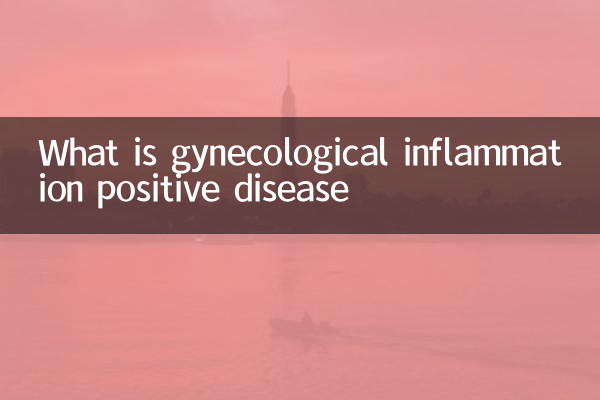What is gynecological inflammation positive disease
In recent years, gynecological inflammation has become one of the hot topics in the field of women's health. Many women find that their gynecological tests are positive during physical examinations or medical treatment, but the specific meaning and impact are unclear. This article will focus on this topic and combine the hot content of the entire network for the past 10 days to analyze the relevant knowledge about positive gynecological inflammation for you in detail.
1. Definition of positive gynecological inflammation

Positive gynecological inflammation usually refers to the discovery of certain pathogens or abnormal inflammation indicators through laboratory tests (such as routine leucorrhea, HPV test, etc.) during gynecological examinations. Common positive results include bacterial vaginitis, fungal vaginitis, trichomonal vaginitis, mycoplasma infection, chlamydia infection, and HPV infection.
2. Common types and symptoms of positive gynecological inflammation
| type | Common pathogens | Main symptoms |
|---|---|---|
| Bacterial vaginitis | Gardner bacteria, anaerobic bacteria | Increased leucorrhea, off-white, fishy smell |
| Mold vaginitis | Candida albicans | Lipid discoloration, vulva itching |
| Trichomonas vaginitis | Vaginal trichoworm | Yellow-green foamy leucorrhea, vulva burning heat |
| Mycoplasma infection | Ureaplasma ureaplasma | Urethral sting, lower abdomen |
| Chlamydia infection | Chlamydia trachoma | Cervical congestion, contact bleeding |
| HPV infection | Human papillomavirus | Possibly asymptomatic, or with cervical lesions |
3. The dangers of positive gynecological inflammation
1.Impact quality of life:Symptoms such as itching and odor in vulva may cause anxiety and embarrassment in women, affecting social interaction and couple's life.
2.Causing complications:Long-term untreated inflammation may lead to upward infection, leading to pelvic inflammatory disease, blockage of fallopian tubes, and even infertility.
3.Increase cancer risk:If the persistent infection of high-risk HPV may develop into cervical cancer.
4. Treatment and prevention of positive gynecological inflammation
| Treatment method | Applicable | Things to note |
|---|---|---|
| Antibiotic treatment | Bacterial, Mycoplasma/Chlamydia infection | The drug needs to be used throughout the process to avoid drug resistance |
| Antifungal drugs | Mold vaginitis | Keep the vulva dry and avoid excessive sugar intake |
| Anti-trichomonas drugs | Trichomonas vaginitis | Sexual partners need synchronous treatment |
| HPV vaccine | HPV infection prevention | Vaccination is beneficial even after infection |
Preventive measures:
1. Keep the vulva clean and dry, and avoid excessive flushing of the vagina.
2. Choose cotton underwear to avoid tight clothing.
3. Pay attention to sexual hygiene and use condoms.
4. Regular gynecological examinations are recommended at least once a year.
5. Answers to recent hot questions
1."Can gynecological inflammation be positive be contagious?"Some pathogens (such as trichomonas, mycoplasma, HPV) can be transmitted through sexual contact and require partner treatment.
2.“Does the test be positive but no symptoms need treatment?”If HPV infection is caused, it must be determined based on typing; if other inflammations are significantly unbalanced in bacteria, intervention is recommended.
3.“Can probiotics treat inflammation?”Specific probiotics (such as Lactobacillus) can help regulate vaginal microecology, but cannot replace drug treatment.
Conclusion:Positive gynecological inflammation is not a disaster, but it needs to be taken seriously. Through standardized treatment and scientific prevention, most patients can obtain a good prognosis. It is recommended that female friends have regular physical examinations and seek medical treatment in time if they find abnormalities. Do not take medicine on their own or avoid medical treatment.

check the details

check the details